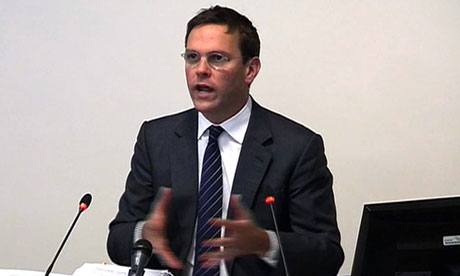James Murdoch’s memory was very particular when it came to information he was sure he hadn’t had.

At 1pm, as Lord Justice Leveson rose for lunch and James Murdoch stepped off the stand to make a break for the high court loos, Robert Jay QC spun on his heels and mouthed to a colleague: "This is so much fun!"
The lead counsel to the Leveson inquiry had been on his feet – more accurately, leaning quizzically across a podium – for three hours, questioning the former News International and BSkyB chairman on the company's corporate culture, provoking him over how he appointed his papers' editors and his knowledge of the "for Neville" email.
But he was only just getting started, and as he, too, repaired for lunch, he wasn't even trying to suppress his grin.
It is unlikely Murdoch would have echoed Jay's lunchtime assessment. He had succeeded, it is true, in sidestepping a number of potential landmines – ethical and editorial responsibility at the News of the World, for instance, was "very much in the hands of the editor". Frequently he was unable to help the inquiry because of gaps in his recollection of events – though at times his memory was very particular indeed when it came to information he was sure he hadn't been given, since "if it had gone into any of those matters I would have remembered".
But Jay's assiduous provocation – lawyers can be awfully rude when they want to be – had managed, once or twice, to bring a quick flash of anger to Murdoch's carefully rehearsed performance. It would have been "cack-handed and frankly ridiculous", Jay interrupted at one point, for a senior lawyer to have given Murdoch an estimate of hacking payout damages inclusive of legal fees, as the former chief executive suggested, as opposed to the settlement sum alone. The tanned face flushed pink. "That's not what I recall."
And yet, for all Jay's evident enjoyment of the contest, it was becoming increasingly clear that it wasn't News International that would end the day battle-scarred. Could they move on to the company's contacts with senior politicians, Jay asked – what Murdoch had called "a legitimate bit of business advocacy" but which he called "lobbying"? "Yes, either one," said Murdoch.
He had met with Tony Blair of course, he said, and Gordon Brown, too, though his meetings with the latter were "mostly social" – "I don't remember that he would have told me lots of things about the economy and the like."
"And then Mr Cameron," said Jay. "Probably best to deal with this chronologically."
Court 73, for all the import of the events taking place within it, is a quiet and undramatic place, stuffed full of court officials and dark-suited lawyers, and journalists scribbling furiously at the benches at the rear. Even as Jay led Murdoch, very deliberately, through News International's contacts with Cameron, the room remained almost silent, with only the occasional inadvertent, astonished giggle. The real drama was taking place a mile or two to the west – if one listened very hard, one could just hear the sound of panicked mobile phones starting to ring in Whitehall.
Not that Murdoch was conceding that there had been anything inappropriate about the company's contacts with politicians. Before Cameron had become prime minister, Murdoch said, he had met him "at social events or dinners at other people's homes". And obviously he would have been keen to know where Cameron stood on issues that would affect News International? "Not really." But "it would be to the commercial advantage of the company – some would say your duty – to find out where the leader of the opposition stood" on issues like media regulation, pursued Jay. "That's not the way I do business."
There was a meeting in September 2009 – drinks in "the George" – when Murdoch had informed Cameron that the Sun would endorse the Tories at the next election. And then there was the dinner at the Brooks's on 23 December 2010, a gathering at which Cameron has in the past showed great reluctance even to confirm his attendance. Murdoch, happily, did recall a discussion with the prime minister about the Sky bid. But it had been just "a tiny side conversation at a dinner where all these people were there, so it wasn't really a discussion, if you will".
At last, Jay turned to Frédéric Michel, BSkyB's "lobbyist" – "liaison with policymakers" corrected Murdoch – and his emails to his boss about his contacts with Jeremy Hunt, both before and after he became the minister charged with adjudicating on BSkyB's bid in December 2010. The journalists at the back of the room began craning forward to read the screens, eyebrows shooting increasingly skyward.
It was important, Murdoch stressed repeatedly, not to misunderstand what they suggested. So when in January 2011, for example, Michel advised his boss that to meet Hunt then "would be counterproductive, but you should have a chat with him on his mobile, which is completely fine," Jay was wrong to take that to mean "if it was all surreptitious it was OK".
"I took that to mean that maybe a small call would be OK," said Murdoch. Once again, size was all.
Jay had 80 emails to go, he confessed at one point, but they were "all along similar lines", so he would pick a selection. But the key thing, Murdoch stressed, was that none of this interaction was inappropriate. Fine, said Jay. "We'll keep going and see the sort of contacts that took place ... and we might begin to see whether they fall into the appropriate box or the inappropriate box."
That is now a task for others.

Comments